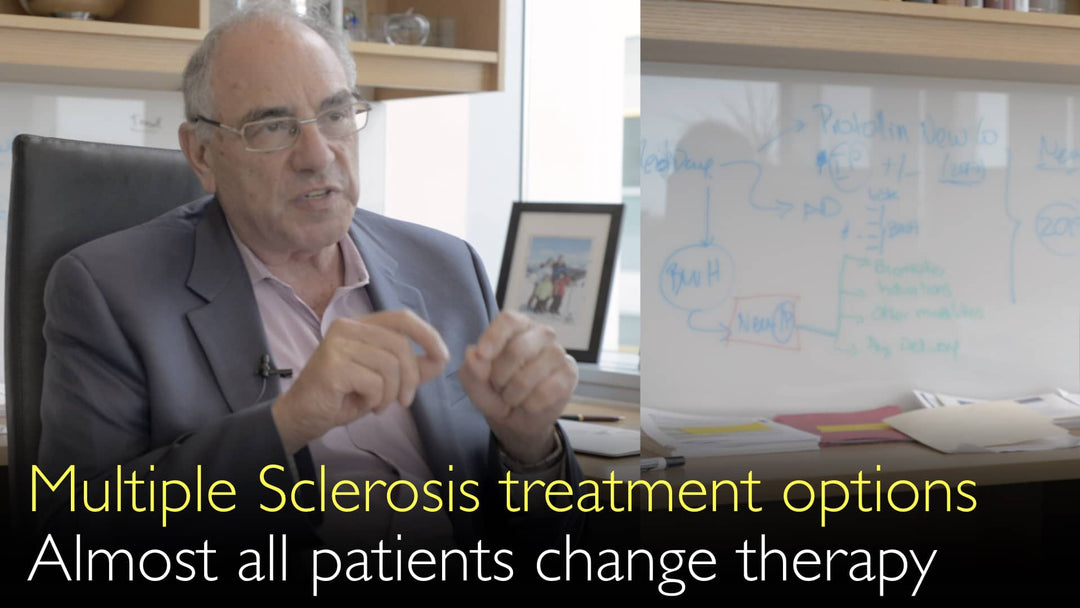Leading expert in multiple sclerosis, Dr. Howard Weiner, MD, explains how treatment options have expanded significantly. He details the roadmap for MS therapy, emphasizing the critical difference between relapsing-remitting and progressive stages. Dr. Howard Weiner, MD, states that every patient with relapsing disease should start treatment immediately. He highlights that virtually all patients will change medications during their disease course due to new drug development and the need for optimal efficacy. Monitoring through clinical relapses and serial MRI scans is essential to ensure a treatment is working.
Navigating Multiple Sclerosis Treatment Options and Medication Changes
Jump To Section
- MS Treatment Landscape and Stages
- Initiating MS Therapy
- Monitoring Treatment Efficacy
- Reasons for Medication Switch
- Types of MS Medications
- Full Transcript
MS Treatment Landscape and Stages
Dr. Howard Weiner, MD, outlines the current multiple sclerosis treatment landscape, which now includes over ten disease-modifying medications. He clarifies the two distinct stages of the disease that guide treatment decisions. The relapsing-remitting multiple sclerosis stage has many available treatment options. In contrast, the progressive multiple sclerosis stage has far fewer effective therapies, representing a significant area of unmet need.
Initiating MS Therapy
Dr. Howard Weiner, MD, provides a clear directive for patients newly diagnosed with relapsing-remitting MS. He states that every patient with active relapsing disease should begin a disease-modifying therapy without delay. The initial choice of a specific medication is less critical than the act of starting treatment itself. Dr. Howard Weiner, MD, explains to Dr. Anton Titov, MD, that the selection process is personalized and depends on a discussion between the individual patient and their doctor.
Monitoring Treatment Efficacy
Dr. Howard Weiner, MD, emphasizes that starting therapy is only the first step. Continuous monitoring is essential to confirm a medication is effectively controlling the disease. Efficacy is measured by tracking clinical multiple sclerosis relapses and through the use of serial MRI scans. A typical monitoring protocol might involve an MRI every six months for the first year or two after starting a new medication. After this period, scans are often done annually or whenever new neurological symptoms appear.
Reasons for Medication Switch
Dr. Howard Weiner, MD, reveals a key insight from his vast clinical practice. He tells Dr. Anton Titov, MD, that virtually all multiple sclerosis patients will switch medications at some point. This high rate of change is driven by two main factors. First, approximately 25% of patients do not respond well to their initial therapy, necessitating a switch for better efficacy or due to side effects. Second, the rapid evolution of MS treatment means new, often superior medications are continually becoming available.
Types of MS Medications
The array of multiple sclerosis medications available today falls into three broad categories based on their administration. Dr. Howard Weiner, MD, describes injectable medications, oral medications, and medications administered by infusion. Newer medications often offer improved risk-to-benefit profiles, greater effectiveness, and easier administration methods compared to older therapies. This expanding family of options allows for more personalized and precise medicine in multiple sclerosis care.
Full Transcript
Dr. Anton Titov, MD: Multiple sclerosis treatment options have expanded in recent years. There are over ten, or probably more, disease-modifying medications against multiple sclerosis. Most of our viewers are outside of the United States. Not all multiple sclerosis medications are available, but nevertheless, it is an increasing family of potential options for multiple sclerosis treatment.
Could you please discuss a roadmap of multiple sclerosis therapy? How to choose the best treatment for a given patient with multiple sclerosis?
Dr. Howard Weiner, MD: This is a big question. There are two stages of multiple sclerosis. There is a relapsing-remitting multiple sclerosis stage, and then there is the progressive multiple sclerosis stage.
We have many treatments for the relapsing-remitting multiple sclerosis stage. We have few treatments for the progressive multiple sclerosis stage.
Every patient who is diagnosed with multiple sclerosis and has relapsing disease should be treated. The question is, which medication should they take?
Dr. Anton Titov, MD:
Dr. Howard Weiner, MD: I can't say that they should take medication A or B. The most important thing is for every patient to start multiple sclerosis therapy.
What is important is, after they go on therapy, they need to be monitored to make sure the therapy is working. If treatment is working, it is fine.
Efficacy of treatment is determined by measuring multiple sclerosis relapses and MRI scans. Sometimes patients have side effects or they are still having multiple sclerosis symptoms. Then they should be changed to another medication.
There are injectable multiple sclerosis medications, there are oral multiple sclerosis medications, and there are medications given by infusion. It depends on the patient and the doctor.
The multiple sclerosis activity monitoring is done also by serial MRI scans. Sometimes we start somebody on a multiple sclerosis medication. Then we start with an MRI every six months for a year or two, and then every year or if they have new symptoms.
Dr. Anton Titov, MD: You have a vast multiple sclerosis practice. How often do you have to switch patients from one medication to another based on those monitoring results?
Dr. Howard Weiner, MD: It is hard to say because the multiple sclerosis medications keep changing. But I would say virtually all of our multiple sclerosis patients have switched from one medication to another. That is because new multiple sclerosis medications keep coming out.
Dr. Anton Titov, MD: I see, and those new multiple sclerosis medications presumably have a better risk-to-benefit ratio?
Dr. Howard Weiner, MD: New medications may be more effective, they may be easier to take. Maybe 25% of our patients don't do well on one medication. We have to switch to another multiple sclerosis medication.
Treatment of multiple sclerosis rapidly evolves. New medications appear. Precision medicine diagnostic tests match patients with the most effective medications.







